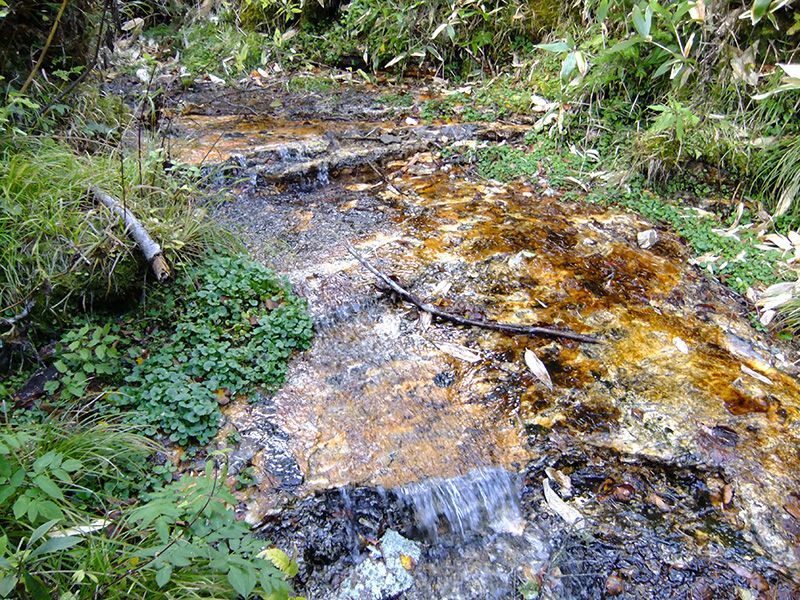Bulletin of the Geological Survey of Japan Top Page
Bulletin of the Geological Survey of Japan Vol.66 No.7/8 (2015)
Cover photograph | Table of Contents | Abstract
Cover photograph
Silica sinters exposed on the riverbed in Shikaribetsu, Hokkaido
Silica sinters, more than 4-5 meters wide and several tens meters long, develop along the small creek in the west of Shikaribetsu Lake, Hokkaido. Wide variety of textures are observed in the floating pebbles, including fine lamination with distinct color contrast, cast of bacterial colony, botryoidal surface, reddish black ball inclusion, oolitic texture, and homogeneous milky white mass like porcelain. The photograph was taken on October 3rd, 2013. Please refer to Okazaki et.al. (in this issue) for details.
(Photograph by Yasuyuki Oppata and Caption by Chizuko Okazaki, Hiroharu Matsueda, Yutaka Kanai, Naoki Mita, Masahiro Aoki and Yasuyuki Oppata)
Table of Contents
All the pages PDF : 66_07_full.pdf [2.8MB]
| Title | Author | |
|---|---|---|
| Article | ||
| A study on the analytical methods of uranium in the weathered carbonatite samples from Brazil |
Yutaka Kanai (p159-167)
|
66_07_01.pdf [890KB] |
| Report | ||
| Preliminary report on mineralogy and geochemistry of opals from the Shikaribetsu area, central Hokkaido |
Chizuko Okazaki, Hiroharu Matsueda, Yutaka Kanai, Naoki Mita, Masahiro Aoki and Yasuyuki Oppata (p169-178)
|
66_07_02.pdf [1.9MB] |
Abstract
A study on the analytical methods of uranium in the weathered carbonatite samples from Brazil
Yutaka Kanai
Carbonatite ore deposits attract much attention as resources of Nb and rare earth elements. Analytical method of uranium in weathered carbonatite ore deposit in Brazil was studied. The KOH fusion, which is used for the determination of U in rock samples, is proved to be applicable to the decomposition of such samples. The gamma-spectrometry is non-destructive and suitable for samples containing insoluble minerals. The ICP analysis combined with acid decomposition might produce low results owing to the insufficient decomposition of samples. The KOH fusion–fluorimetry method was applied to the weathered carbonatite samples taken from Brazil and good results were obtained. U contents ranged from 10 to 1200 ppm, which are higher than the average contents of rocks and soils. U seemed to be concentrated during the weathering process.
Preliminary report on mineralogy and geochemistry of opals from the Shikaribetsu area, central Hokkaido
Chizuko Okazaki, Hiroharu Matsueda, Yutaka Kanai, Naoki Mita, Masahiro Aoki and Yasuyuki Oppata
Opal boulders taken from the Shikaribetsu area, central Hokkaido, were preliminarily studied on their occurrences, properties and chemical compositions. They suggested hydrothermal activities in the past. Opals showed fluorescence of red, green, orange, yellow and blue colors. Some of them were enriched in gold, silver, mercury, arsenic, antimony and tellurium compared with the crustal abundance of elements.
Geological Survey of Japan, AIST
- About GSJ
- Our Activities
- Purchase guide
-
Publications and Database
- information
- Bulletin of the Geological Survey of Japan
- bull2025(Vol.76)
- bull2024(Vol.75)
- bull2023(Vol.74)
- bull2022(Vol.73)
- bull2021(Vol.72)
- bull2020(Vol.71)
- bull2019(Vol.70)
- bull2018(Vol.69)
- bull2017(Vol.68)
- bull2016(Vol.67)
- bull2015(Vol.66)
- bull2014(Vol.65)
- bull2013(Vol.64)
- bull2012(Vol.63)
- bull2011(Vol.62)
- bull2010(Vol.61)
- bull2009(Vol.60)
- bull2008(Vol.59)
- bull2007(Vol.58)
- bull2006(Vol.57)
- bull2005(Vol.56)
- bull2004(Vol.55)
- bull2003(Vol.54)
- bull2002(Vol.53)
- bull2001(Vol.52)
- Bulletin of the Geological Survey of Japan(old)
- Annual Report on Active Fault and Paleoearthquake Researches
- Reports, Geological Survey of Japan
- CCOP-GSJ Groundwater Project Report
- CCOP Technical Bulletin
- Cruise Report
- Geological Hazards
- Learning and Education
- GSJ Database Collection
- Collection of links


